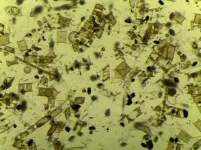(Press-News.org) As much as a year's worth of past academic progress made by disadvantaged children in the Global South may have been wiped out by school closures during the COVID-19 pandemic, researchers have calculated.
The research, by academics from the University of Cambridge and RTI International, attempts to quantify the scale of learning loss that children from poor and marginalised communities in the Global South may have experienced, and the extent to which home support and access to learning resources could ameliorate it. While it is known that the education of these children has suffered disproportionately during the pandemic, it is much harder to measure exactly how much their academic progress has been impeded while schools have been closed.
The researchers used data from Ghana to model the likely impact of closures for children in remote and deprived parts of that country. They found that on average, 66% of the learning gains made in foundational numeracy during the academic year are lost during three months out of school. The outcome is, however, far worse for children without adequate home learning resources or support.
The authors suggest these findings provide a glimpse of a much wider pattern of learning loss that is being experienced by millions of disadvantaged children around the world.
Co-author Professor Ricardo Sabates, from the REAL Centre in the University's Faculty of Education, said: "Despite teachers' best efforts, we know school closures have held up, or reversed, the progress of millions of children. This study is one approach to estimate how much learning could have been lost, and how much worse this may have been for children from disadvantaged settings."
"These figures represent an estimate of learning loss for children who spent 3 to 4 months out of school. We expect that as schools remained closed for longer, losses could be higher. We also acknowledge the important support that many families and communities provided with supplementary learning, which may have in turn limited the potential loss overall."
The study built on earlier research that highlighted the significant learning losses that occur when certain groups of children in developing countries move from one academic year to the next, particularly those who change language of instruction, and disadvantaged girls.
The researchers used data charting the progress of more than 1,100 students on Ghana's Complementary Basic Education (CBE) programme between 2016 and 2018. This programme supports children aged eight to 14 who would not normally attend school, providing them with education in their own language and at flexible times. On completion, students are encouraged to enrol at a local government school, but the start of that school year occurs after a three-month gap, during which they receive no education.
The researchers compared participants' scores in foundational maths tests at four stages: when they started the CBE, when they finished, when they joined a government school, and after their first year in government school. They also accessed data about how much home learning support the students had - for example, whether they had books at home, or could seek help from an adult when struggling with homework.
During the CBE programme, the students' test scores improved, on average, by 27 percentage points. When they were tested again after the three-month gap, however, their scores had reduced by an average of 18 percentage points. Two-thirds of the gains these students had made during the previous academic year were therefore lost while they were out of school. The researchers argue that this is an upper estimate of the expected scale of loss during an equivalent period of school closures due to COVID-19. Fortunately, during the pandemic community efforts to enhance learning may have mitigated this effect for some children.
In spite of this, they also found that the basic learning loss was compounded among children who lacked support to study at home. For example:
* Children without access to reading and learning resources at home (such as books) experienced a learning loss above 80%.
* Children who said that they never asked adults in their household for help experienced a learning loss of around 85%.
Encouragingly, the study showed that in the first year of formal education, students not only recouped their learning loss, but improved, while the attainment gap between more and less advantaged students narrowed.
In many countries, however, it is becoming clear that many disadvantaged students - especially marginalised groups such as disabled children and many girls - are not returning to school. Therefore, the researchers suggest supporting access to diverse forms of education for students from less-advantaged backgrounds. There is evidence to show that community-based programmes, for example, can enhance a range of learning skills for these children. "Learning at home and in communities has to be reimagined if rapid gains are to be achieved as we continue to face the COVID-19 situation," the authors say.
The pattern of learning loss charted in Ghana may also apply far beyond the Global South. "This is an international challenge," said co-author Emma Carter, also from the REAL Centre. "In Europe and the US, children from lower socio-economic backgrounds will similarly be experiencing severe learning loss. The levels of attainment may differ between countries, but it is highly likely that the pattern of loss remains."
The evaluation data used in the study was commissioned and funded by FCDO Ghana. The research is published in the International Journal of Educational Development.
INFORMATION:
Women with polycystic ovary syndrome (PCOS) are at a significantly increased risk of contracting COVID-19 than women without the condition, new research led by the University of Birmingham has revealed.
Researchers are now calling for healthcare policy to specifically encourage women with PCOS to adhere to COVID-19 infection control measures while the global pandemic continues.
Polycystic ovary syndrome (PCOS) is a common condition affecting around one in 10 women in the UK. The three main symptoms are irregular periods, high levels of "male" hormones which may cause physical signs such as excess facial or body hair, and a cystic appearance on an ultrasound or MRI scan of the ovaries which is caused by follicles becoming increasingly fluid filled as they fail to develop and ...
Researchers at Charité - Universitätsmedizin Berlin and TU Berlin as well as the University of Oslo have developed a new tissue-section analysis system for diagnosing breast cancer based on artificial intelligence (AI). Two further developments make this system unique: For the first time, morphological, molecular and histological data are integrated in a single analysis. Secondly, the system provides a clarification of the AI decision process in the form of heatmaps. Pixel by pixel, these heatmaps show which visual information influenced the AI decision process and to what extent, thus enabling doctors to understand and assess the plausibility of the results of the AI analysis. This represents ...
People with unhealthy heart structures and poorer functioning hearts have a significantly higher risk of being diagnosed with COVID-19 infection, according to research by Queen Mary University of London, in collaboration with the Medical Research Council Lifecourse Epidemiology Unit (The University of Southampton).
The researchers made use of the comprehensive and internationally unique UK Biobank database, which includes health and genetic information from over half a million participants from across the UK, including detailed magnetic resonance imaging (MRI) of their hearts as well as linkages to COVID-19 test results from Public Health England.
The team investigated records from 310 Biobank participants to see whether pre-existing features of the heart ...
In light of the United Nations (UN) declaration that 2021-2030 is the UN Decade on Ecosystem Restoration, a group of scientists voice concerns about restoration in heavily fragmented landscapes under a hotter and drier future scenario.
Poor recovery of small fragments will end up costing management and wider society later down the line. Millions are invested in setting aside patches, but management is then weak and costly.
Rainforests turn into oil palm plantations
The past 40 years in Southeast Asia have seen about 50% of lowland rainforests converted to oil palm and other plantations, and much of the remaining forest heavily logged.
Little is known about how fragmentation influences recovery and whether climate change will hamper restoration.
"Here, we use repeat airborne ...
Scientists have pinpointed the location of an essential enzyme in plant cells involved in photosynthesis, according to a study published today in eLife.
The findings overturn conventional thinking about where the enzyme resides in plant cells and suggest a probable role in regulating energy processes as plants adapt from dark to light conditions.
During photosynthesis, plants convert carbon into energy stores through 'electron transport', involving an enzyme called ferredoxin:NADP(H) oxidoreductase, or FNR.
Plants can switch rapidly between two types of electron transport - linear electron flow (LEF) and cyclic electron ...
Gas and liquid separation processes in the chemical industry could be made more efficient and environmentally friendly by using substances known as intrinsically porous materials (IPMs). KAUST researchers review the prospects for IPMs in the journal Accounts of Chemical Research.
Niveen Khashab and her team are currently heavily involved in IPM research. "We focus on making materials that will have an impact on the chemical and petrochemical industries in Saudi Arabia and the world," says Niveen Khashab, the corresponding author of the review.
IPM materials can separate gases and liquids without using traditional ...
The annually occurring algal spring blooms play an important role for our climate, as they remove large amounts of carbon dioxide from the atmosphere. However, they are an ephemeral phenomenon. Most of the carbon is released into the water once the algae die. There, bacteria are already waiting to finish them off and consume the algal remains.
Previous studies have shown that in these blooms, different algae can come out on top each year. However, within the bacteria subsequently degrading the algae, the same specialised groups prevail year after year. Apparently not the algae themselves but rather their components ...
According to an international study published in Frontiers in Psychology, people around the world have reported changes in their physical activity levels, wellbeing, and eating habits during the first stages of the COVID-19 pandemic. A decrease in physical activity during the pandemic was associated with poorer perceived physical and mental health. Reduced exercise was also associated with perceptions of weight gain and decreased sleep.
More than a thousand individuals from several countries with different containment measures participated in an online survey that explored changes in physical activity, eating, sleep, physical and mental health, and wellbeing during the first lockdown phases ...
A RAND Corporation report funded by The Rockefeller Foundation shows that COVID-19 testing can be effectively integrated into K-12 schools' pandemic response plans, helping families and staff feel more comfortable with in-person instruction.
The report found that even for well-resourced districts and schools, launching a COVID-19 testing program was a major undertaking that required access to rapid-turnaround tests, additional staffing or strong partners for logistical support, technical assistance for the design and execution of testing programs, and a strategy for successfully engaging the school community to participate ...
Adding a simple polymer to fertilizers or pesticides could dramatically reduce agricultural pollution, suggests a new study by researchers at the University of British Columbia.
When agrochemicals are sprayed onto crops, a large amount typically ends up in the surrounding environment due to droplets splashing, rebounding or rolling off the target plants.
This amount could be cut at least in half by mixing fertilizers and pesticides with a small quantity of polyethylene oxide, a common polymer additive that improves the ability of agrochemical solutions to stick to plant surfaces, ...



